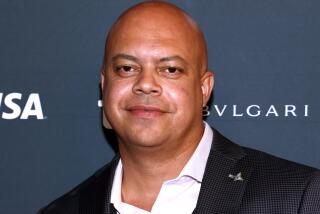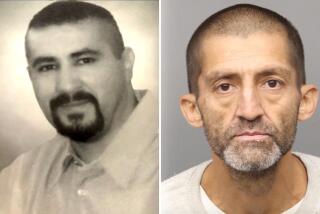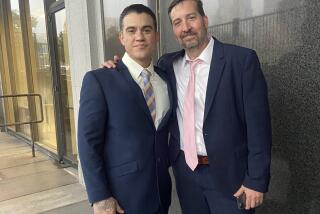Mexico Judge Frees Defendants in Case of Slain TV Star
- Share via
MEXICO CITY — A celebrity murder case that has captivated Mexico took a stunning turn Thursday when a judge cleared all six suspects in the mob-style killing of television comedian Francisco “Paco” Stanley, saying there wasn’t enough evidence to convict them.
Although prosecutors could appeal to a higher court, the judge’s decision was a serious setback to their team, which had tried to prove that Stanley’s comic sidekick plotted to murder him. A reputed drug lord, a Uruguayan dancer and three others were in on the plot, prosecutors alleged. All but the reputed drug lord were released.
Judge Rafael Santana Solano read the verdict to reporters and relatives of the defendants packed tightly into a sweltering second-floor hallway. Earlier, a brawl broke out between photographers jostling for spots.
The June 1999 killing, carried out in daylight, stunned Mexico. Stanley, one of the country’s best-known television personalities, was leaving a Mexico City taco restaurant with friends when gunmen riddled his black SUV with at least two dozen bullets. A bystander also died, and three people--including one of the friends--were wounded.
Thursday’s verdict riveted the Mexican public once again. TV stations pulled away from regular programming all day to give updates.
When the judge finally read the verdict--more than three hours late because, reporters were told, a copy machine had broken down--cheers erupted in the building, and family members of the defendants hugged and wept.
After reading the verdict, the judge ordered the immediate release of Mario Bezares, Stanley’s television co-host; Paola Durante, a dancer with a bit part on the show; Jose Martinez, an assistant on the show; Jorge Garcia, Stanley’s chauffeur the day he was killed; and Erasmo Perez Garnica, alias “El Cholo,” who was accused of being one of the gunmen.
Luis Amezcua, a reputed drug lord accused of ordering the hit from his prison cell, will remain in jail for other crimes but was also cleared in the Stanley case.
All six had been charged with premeditated murder, attempted murder and causing bodily harm.
Stanley, who was 56 when he died, hosted a top-rated variety program called “One After the Other,” on the Azteca television network.
He was hardly buried when authorities announced that they had found traces of cocaine in his urine. Bezares, who had accompanied him to the restaurant, was also found to have cocaine in his system.
Prosecutors also alleged that Stanley had ties to organized crime, and they said the killing was a professional hit.
The biggest shock in the case, however, came the following month, when authorities arrested Bezares on suspicion of participating in a murder plot. Investigators said he and the other four had carried out a plot ordered by Amezcua from prison.
Stanley was said to have owed Amezcua, one of three brothers known as “The Speed Kings,” a large sum of money.
Bezares played straight man to Stanley’s often vulgar and demeaning humor. He seemed to quietly bear his frequent humiliation on the show. But investigators said that he stood to gain from Stanley’s death and that he helped delay the television star’s exit from the restaurant.
All those charged claimed innocence, and Durante’s family in particular campaigned strongly for her release.
The case became controversial and increasingly baroque. The prosecution’s case had relied heavily on the testimony of a convicted armed robber named Luis Gabriel Valencia, nicknamed “The Flame,” who was allegedly Amezcua’s cook in jail.
Valencia claimed to have overheard Amezcua make incriminating statements, but he recanted months later, saying he had been threatened and forced to lie.
Bezares was emotional Thursday, thanking his lawyers, the judge, the Mexican people and the media for his release.
Television stations covered the events in a manner reminiscent of O. J. Simpson’s car chase. Media helicopters followed Bezares’ black sport-utility vehicle down the freeway and circled over his house.
Juan Luis Montero, Durante’s lawyer, said the case was “an advance for Mexican justice, but we can’t call it a victory.” The case against Durante was a “caprice,” he said, that cost the dancer months of her life.
Prosecutors, meanwhile, said they will respect the verdict but will examine the ruling closely and probably appeal. “We may have to open new lines of investigation,” said Bernardo Batiz, Mexico City’s attorney general.
*
Jose Diaz Briseno of The Times’ Mexico City Bureau contributed to this report.
More to Read
Sign up for Essential California
The most important California stories and recommendations in your inbox every morning.
You may occasionally receive promotional content from the Los Angeles Times.










